
8 Great Reasons to Concept Test
Concept testing is that stage in product or marketing campaign development where concepts (usually detailed descriptions or storyboards) are evaluated to determine if they have enough potential for further investment and development. With the astounding rates of new product failure in the market, it is safe to assume that many businesses neglect this critical phase.
Concept testing is done both with surveys as well as qualitative research (such as focus groups or in-person interviews). Base your concept test methodology on both who you need to include in the research as well as whether your concept lends itself to being presented graphically or verbally, without rational explanation or discussion. In either case, the research investment conducted at the concept testing phase is minimal compared to launching a new product that does not meet sales goals or one that needs extensive re-tooling or re-marketing post-launch.
Here are some of the many purposes of concept tests:
- To develop the original idea further. Often, either with or without customer input, we have a brainstorm of a “killer” new product. Or do we? Running a quick concept test will tell you whether your product has the potential to justify investment in further development.
- To estimate the concept’s market potential. Okay, we think the concept is terrific, and some customers seem to like it, but will enough of them buy it at a price point that allows a profit? Sometimes, it is critical to know whether you have a blockbuster or a niche product to guide further investment. You never want to overinvest in a product that can’t carry the weight.
- To eliminate lower-potential concepts. As a corollary to the first two bullets, you may find that your great idea is not so great. Identifying and killing low-potential product ideas before they drain resources unnecessarily is another important purpose of concept tests.
- To determine the value of concept features and benefits. Knowing what your customers like (or dislike) about your new concept can guide future development. Additionally, it is important for marketers to understand what benefits to communicate to the target audience at launch – and beyond.
- To identify the highest potential customer segments. Who likes the concept the most, and why? Who is likely to be an early adopter – and even potentially a loyal purchaser? Understanding your customer base can help you optimize your product launch.
- To estimate of sales or trial rate. To scale up production of the new product (or delivery in the case of a new service), you need to have an estimate of how much you will sell or what percentage of current customers will try the new offering. You must avoid disappointing customers because you failed to forecast uptake for your new offering correctly.
- To identify optimal messaging and inform marketing plans for launch. Which marketing messages resonate with your early adopters? What sales channels should you use for the start? Understanding how to appeal to your most initial customers is critical for the successful launch of any new product
- To refine marketing plans post-launch. Once you have started, you need to roll-out the product into full distribution. Will the launch marketing work for this purpose, or are different customers going to need different channels and messaging?
Innovation, and developing new products and services, is the lifeblood of your business. Don’t leave that critical function to chance. You can vastly reduce the risk of product failure – and increase the probability of new product success – by conducting concept tests at key points in taking a new product or service to launch.
